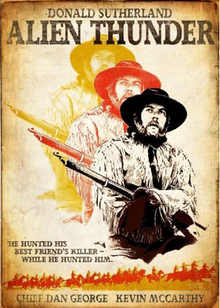Alien Thunder (also known as Dan Candy's Law) is a 1974 Canadian Northern film directed by Claude Fournier and starring Donald Sutherland, Gordon Tootoosis, Chief Dan George, and Kevin McCarthy. Its original screenplay was written by W.O. Mitchell but Mitchell removed his name from the final release due to changes that were made.[1]
| Alien Thunder | |
|---|---|
 Video cover | |
| Directed by | Claude Fournier |
| Written by | George Malko |
| Produced by | Marie-José Raymond |
| Starring | Donald Sutherland Gordon Tootoosis Chief Dan George Kevin McCarthy Jean Duceppe |
| Cinematography | Claude Fournier |
| Edited by | Yves Langlois |
| Music by | Georges Delerue |
Production company | Onyx Films |
| Distributed by | Ambassador Film Distributors (Canada) American International Pictures (USA release) Cinerama Releasing Corporation |
Release date |
|
Running time | 93 minutes |
| Country | Canada |
| Language | English |
| Budget | $1,500,000 |
Synopsis
editSet in the North-West Territories in the 1890s after the North-West Rebellion, Alien Thunder is based on a true story about a Woods Cree (Gordon Tootoosis in his first film role) who kills a North-West Mounted Police sergeant (Kevin McCarthy) under desperate circumstances. Hunted for two years by the sergeant's resolute partner (Donald Sutherland), the ending brings tragedy for all those involved.
Historical background
editThe film is based on the interaction between a young Cree man, Almighty Voice, and the NWMP. Tootoosis's character is based on Almighty Voice, while McCarthy's character is based on Sergeant Colin C. Colebrook of the NWMP, who was killed by Almighty Voice in 1895. Sutherland's character is based on one of the Mounties who tracked down Almighty Voice in 1897.
Cast
edit- Donald Sutherland as Sgt. Dan Candy
- Gordon Tootoosis as Almighty Voice
- Chief Dan George as Sounding Sky
- Kevin McCarthy as Sgt. Malcolm Grant
- Jean Duceppe as Inspector Brisebois
- Francine Racette as Emilie Grant
- Jack Creley as Arthur Ballentyne – Indian Agent
- James O'Shea as Edouard
- John Boylan as Cpl. Harold Bellringer
- Lenny George as Rolling Grass
- Ernestine Gamble as Small Face
- Vincent Daniels as Many Birds
- Sarain Stump as Napoleon Royal
Production
editThe first version of the screenplay for Alien Thunder was written by W. O. Mitchell, a noted Saskatchewan author. However, as filming progressed and changes were made, he asked that his name not be used on the finished version. He was reported to have said: "It’s just not mine anymore."[2]
Alien Thunder was filmed in Saskatchewan at Battleford, Duck Lake, St. Isidore de Bellevue, and Saskatoon. During filming, Sutherland hired a local woman who ran a coffee shop in Bellevue to cook for him during the production, as there were few options for eating out in the small town.[3]
Release
editThe Royal Canadian Mounted Police, which had originally seen the film as a centrepiece of its 1973 centennial celebrations, withdrew its backing. Sutherland stated that Fournier’s direction of the movie was "wretched".[4]
The film was not a financial success.[5] "Suspense is lacking and characters are generally underdeveloped, as is the tension between the Mounties and the Indians.", stated Natalie Edwards for Cinema Canada.[page needed]
An article in Luma found that "Though it laudably uses Indigenous (and principally Cree) actors and some of the Cree language, Alien Thunder is ultimately a film about Mounties and settlers; as sympathetic as it may be to the Cree, they are, as the native peoples of the Americas tend to be in Westerns, reduced to supporting players in their own story. "[1]
References
edit- ^ a b Conway, Alana. ""Blood on the Poplars: ALIEN THUNDER (1974) and the Story of Almighty Voice" !". Luna Quarterly. Retrieved 7 December 2019.
- ^ Joan Beatty, "Onyx Film A Disappointment", Saskatchewan Indian, March 1974, vol. 4, no. 3, p. 27.
- ^ Céline Grimard, " 'To her, he was a hero' – Donald Sutherland remembered by Sask. family", Regina / 980 CJME, 28 June, 2024
- ^ "Quebec filmmaker Claude Fournier adapted Gabrielle Roy's the Tin Flute". The Globe and Mail. 26 March 2023.
- ^ Lerner, Loren R. (January 1997). Canadian Film and Video: A Bibliography and Guide to the Literature. University of Toronto Press. ISBN 9780802029881.
External links
edit- Alien Thunder at IMDb
- Alien Thunder is available for free viewing and download at the Internet Archive